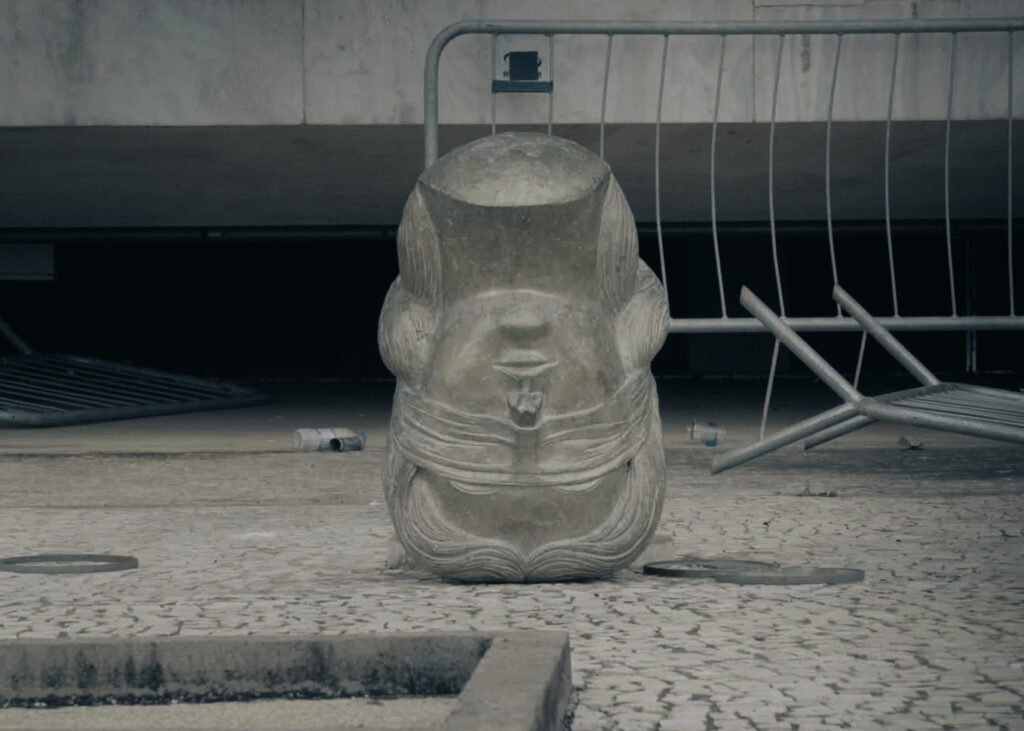by Hudson Moura
In Apocalypse in the Tropics, Petra Costa continues her cinematic inquiry into Brazil’s fragile democratic fabric, this time turning her lens toward the meteoric rise of evangelical power in the country’s political sphere. As an informal sequel to her acclaimed The Edge of Democracy, this documentary unfolds less as an exposé than as a dense, meditative essay on the blurred boundaries between faith and politics, belief and manipulation, morality and power.
Through her now-characteristic voice-over—deliberate, introspective, and emotionally restrained—Costa guides us into a terrain where apocalyptic imagery, biblical prophecy, and political extremism collide. The film investigates the influence of evangelical leaders, particularly the controversial Pastor Silas Malafaia, whose rhetorical strategies and rapid rise to prominence (from 15,000 to over 100,000 followers in 15 years) mirror the emergence of Jair Bolsonaro as a far-right political force. Costa was among the first to film Bolsonaro’s performative prayers in 2016, capturing early on the unsettling fusion of militarism and messianic fervor.
One of the film’s most revealing threads explores the historical roots of the alliance between evangelical fundamentalism and far-right politics in Brazil, tracing it back to the influence of American evangelicals during the military dictatorship. Apocalypse in the Tropics suggests that this ideological export—particularly the anti-communist crusade championed by figures like Billy Graham—laid the groundwork for a theology that equates moral authority with authoritarian order. Graham’s visit to Brazil during the dictatorship, welcomed and endorsed by the regime, is portrayed as a symbolic turning point: a moment when evangelical Christianity was effectively positioned as a bulwark against communism and secularism. This historical embrace of conservative religious values by the military helped forge a lasting alliance between evangelical leaders and political elites—one that continues to shape Brazil’s far-right discourse, from the pulpit to the presidency.
The film’s strength lies in its layered approach: Costa not only critiques the explosive political role evangelicals have come to play in Brazil—representing nearly a third of the population—but also examines how religious narratives, particularly those drawn from the Book of Revelation, have been weaponized to justify violence, intolerance, and authoritarianism. In one chilling scene, Malafaia defends his own public anger and aggression by invoking the wrathful Jesus of scripture, suggesting that rage and righteousness can coexist.
Apocalypse in the Tropics is particularly incisive in its depiction of the pandemic era, when the Bolsonaro government—having failed to deliver a scientifically grounded response—deflected accountability by deferring to divine will. With over 700,000 COVID-related deaths, the film underscores how this political-religious alignment came at a catastrophic human cost. The January 8, 2023 attack on Brasília serves as the film’s culminating event, portrayed not as a sudden rupture but as the logical consequence of years of spiritualized authoritarian rhetoric.

The film is visually restrained but conceptually ambitious, weaving archival footage, interviews, and symbolic references into a compelling tapestry of Brazil’s contemporary crisis. And yet, Costa’s deeply personal narrative style occasionally risks compromising her critical distance. Though she never appears on camera, her first-person narration—marked by a reflective tone and pointed rhetorical questioning—suggests a broader skepticism toward religion itself. As a result, her condemnation of those who manipulate faith for political ends comes across with particular intensity—at times, perhaps more forcefully than the film’s broader argument. This might limit the film’s appeal among viewers who seek a more plural or balanced representation of Brazil’s complex evangelical landscape, which also includes figures engaged in sincere and socially committed religious work.
Still, Apocalypse in the Tropics remains a provocative and timely documentary. Clearly, the film doesn’t aim to provide definitive answers but rather to reflect the complex ideological entanglements that now define much of Brazil’s conception of democracy—where faith, politics, authoritarian nostalgia, and social media spectacle intersect in unsettling ways. By tracing the rise of evangelical influence alongside the militarization of political discourse, Costa exposes a fragile democratic landscape increasingly shaped by myth, moral panic, and divine justification. The film resists simplification, offering instead a layered meditation on how religion, once a private matter of belief, has become an instrument of public power—with consequences that are both deeply intimate and alarmingly structural.
Drawing on both ancient and contemporary meanings of the word “apocalypse”—from revelation to reckoning—Costa challenges viewers to confront not only the collapse of democratic institutions, but the spiritual narratives that have been used to justify that collapse. Whether one shares Costa’s doubts or not, her film leaves no doubt that Brazil’s current political crossroads is as theological as it is constitutional. ![]() 4/5
4/5